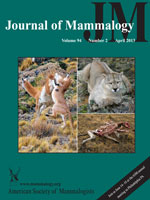Little is known about the sublethal effects of mesocarnivores on small carnivores, which can have important implications regarding the ecology and behavior of the latter. We investigated the ecology of cape foxes (Vulpes chama) and bat-eared foxes (Otocyon megalotis) in the absence of black-backed jackals (Canis mesomelas), a dominant mesocarnivore and predator of both fox species. Results were compared with a concurrent study that investigated the ecology of both fox species in the presence of jackals, at a site <5 km away. In the absence of jackals, densities of cape foxes increased 64% despite similar food and habitat resources between sites, indicating that jackals suppressed cape fox populations. In contrast, jackals did not suppress populations of bat-eared foxes. For both fox species, the absence of jackals resulted in smaller home-range sizes and nonselective use of habitats for den sites, indicating that jackals had sublethal effects on the ecology and behavior of both fox species. Additionally, in the absence of jackals, cape foxes were marginally more active during daytime, whereas bat-eared foxes exhibited smaller group sizes. The 2 fox species became more segregated in the absence of jackals, indicating that jackals also had sublethal effects on the interspecific relationships of fox species. Our results showed that the effects of a mesocarnivore can extend well beyond population suppression of small carnivores, although sublethal effects varied in intensity and often were species specific. Sublethal effects on small carnivores can occur even if population suppression by a mesocarnivore is not occurring.
How to translate text using browser tools
1 April 2013
Lethal and sublethal effects of black-backed jackals on cape foxes and bat-eared foxes
Jan F. Kamler,
Ute Stenkewitz,
David W. Macdonald
ACCESS THE FULL ARTICLE

Journal of Mammalogy
Vol. 94 • No. 2
April 2013
Vol. 94 • No. 2
April 2013
Anti-predator behavior
bottom-up factors
Canis mesomelas
carnivore interactions
Otocyon megalotis
predator avoidance
South Africa




